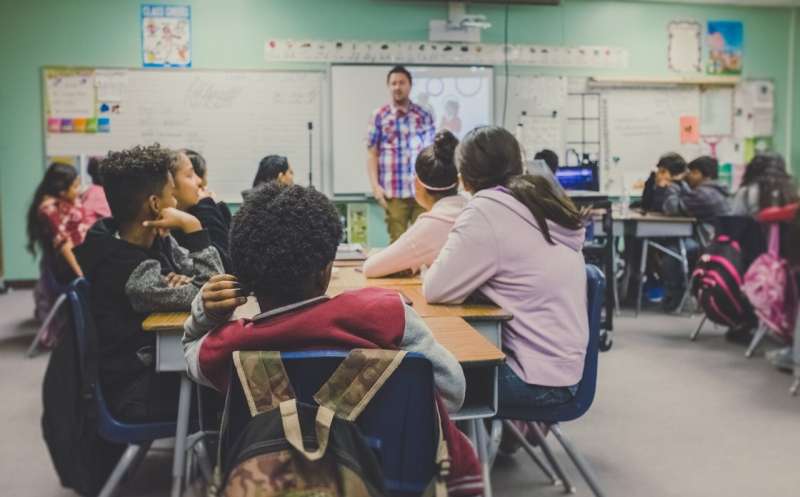This article has been reviewed according to Science X's editorial process and policies. Editors have highlighted the following attributes while ensuring the content's credibility:
fact-checked
peer-reviewed publication
trusted source
proofread
Violence and aggression against educators grew post-pandemic, survey says

While threats and violence against pre-K to 12th-grade teachers and other school personnel in the United States declined during the pandemic, after the restrictions were lifted, incidents rebounded to levels equal to or exceeding those prior to the pandemic, according to research published in American Psychologist.
As a result, the percentage of teachers expressing intentions to resign or transfer rose from 49% during the pandemic to 57% afterward, the researchers found.
"Aggression and violence against educators and school personnel are major concerns that affect the well-being of school personnel and the students and families they serve. This study highlights a growing crisis in our schools that needs to be addressed nationally," said lead author Susan Dvorak McMahon, Ph.D., of DePaul University, chair of the APA Task Force on Violence Against Educators and School Personnel. The task force conducted two surveys in collaboration with national education and related organizations.
The study reported on two surveys. The first, conducted during the height of the pandemic (August 2020 to June 2021), asked approximately 15,000 educators and school personnel to report their experiences prior to and during the pandemic. APA reported on the findings in 2022.
The second survey, conducted in 2022 after many schools had lifted COVID-19 restrictions, polled approximately 12,000 educators and school personnel. Both waves had participants from all 50 states and Puerto Rico, and the racial/ethnic distribution of both samples was similar to the racial/ethnic distribution of teachers and school personnel in the U.S. The American Psychologist article compares the two surveys, showing the trends.
Respondents were asked about their encounters with various forms of violence (including verbal harassment, threats, cyberbullying and physical violence) from students, parents/guardians, colleagues and administrators. They were also asked if they had intended to quit, retire early or transfer to another position within the school system, and had the opportunity to respond to a series of open-ended questions asking them to share details of their experiences, expand on their concerns and offer recommendations for solutions.
Some 65% of teachers in the first wave reported at least one incident of verbal harassment or threatening behavior from a student prior to the pandemic and 53% reported at least one incident from a parent or guardian of a student. Those numbers decreased to 33% and 29%, respectively, during the pandemic, when remote and hybrid schooling were common, but rebounded to 80% and 63%, respectively, in the second survey post-COVID-19.
Teachers also reported a similar pattern when it came to physical violence, with 42% reporting instances with students prior to the pandemic, 14% during the pandemic and 56% after the pandemic restrictions lifted. And while only 1% reported violent encounters with parents prior to the pandemic and less than 1% during the pandemic, that number jumped to 26% post-pandemic.
All of these encounters may be leading to an exodus of education professionals.
"Teacher and staff turnover creates additional challenges for schools and students and makes the job more difficult for those who stay," said McMahon.
While teachers reported the highest numbers in all categories, other school personnel were not immune. School psychologists, social workers, counselors, administrators and other school staff reported similar patterns, with threats and incidents of violence decreasing during the pandemic but rebounding to equal or higher levels after restrictions were lifted.
Across all categories, participants also reported notable increases in anxiety and stress during the pandemic, and while levels decreased slightly post-pandemic, they failed to return to pre-pandemic levels.
"These findings point to a desperate need for a comprehensive approach by policymakers to address violence and aggression against educators and build positive and safe schools," said McMahon. "Educators need to be well trained in addressing psychological, social and emotional needs of students."
The researchers identified several areas where educators need training, including trauma-informed practices, socioemotional learning approaches, working with diverse groups, de-escalation strategies, and behavior and classroom management. They also recommended district and school leaders engage educators and school personnel in discussions regarding school practices, discipline, placement, staffing and school climate.
Policies should also address supporting the mental and behavioral health of students and educators, the researchers said.
"Our research has demonstrated that violence and aggression against teachers—from students, parents, colleagues, and administrators—lead to anxiety and stress, which in turn lead to intentions to transfer schools or quit the profession," said McMahon.
"We need to address the entire ecology of the school, as well as engage with parents and communities in order to improve school climate, work environment and student learning."
More information: Violence and Aggression Against Educators and School Personnel, Retention, Stress, and Training Needs: National Survey Results, American Psychologist (2024). DOI: 10.1037/amp0001348
Journal information: American Psychologist
Provided by American Psychological Association





















